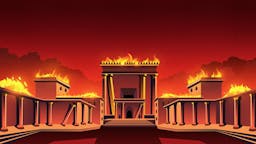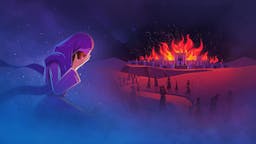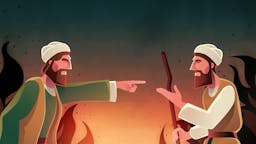The Book of Lamentations (Megillat Eicha)
Explanations to Help You Connect to Tisha B'Av
By Sarah Rashba | 10 July 2025 | 5 Minute Read

Looking for more?
We have hours of delightful videos and podcasts to enhance your 17th of Tammuz experience this year.
Megillat Eicha: Explanations to Help You Connect to Tisha B'Av
As Tisha B’Av begins, we dim the lights and sit on the ground or low chairs, preparing for the public reading of the Book of Lamentations (Megillat Eicha). This central text, along with the recitation of Kinot and the Torah and Haftarah readings from sections in Deuteronomy and Jeremiah, form the traditional liturgy of our Tisha B’Av mourning.
What can we learn from the Book of Lamentations? How does reading it on Tisha B’Av add meaning to our day?
Reading the Book of Lamentations is overwhelming, to say the least. It plunges us into a world where God's fury towards the Jewish People for their sins is starkly evident. Eicha’s scenes of destruction are vividly graphic, and the themes of remorse are distressingly clear. But is it all doom and gloom? Actually, no. Nestled between the lamentations are genuine signs of hope. Jeremiah isn’t blind to the truth; he acknowledges that just as God can destroy, He can rebuild and forgive. The Book of Lamentations presents us with a dual ending—a fascinating detail—with one part expressing hope and the other despair.
The Book of Lamentations challenges us to hold these dual truths in tension, to linger in this liminal space, and to recognize the delicate balance within its verses, and by extension, the day of Tisha B’Av itself.
See the Book of Lamentations in a new light this year – join Rabbi Fohrman as he delves deeper into Eicha’s profound significance in this animated Tisha B’Av course, “Megillat Eicha and Its Secrets”.
Go Deeper: Inspiring Videos for Tisha B'Av
To deepen your understanding of this idea, Aleph Beta offers thought-provoking videos that explore Tisha B’Avs dual themes of tragedy and hope:
- “Shir HaMa’alot: What Does It Mean To Plant With Tears?”: This study of Psalm 126 offers a new way of thinking about where our tears come from and what they might accomplish.
- “The Power of Rachel’s Tears”: This study of the story of the matriarchs Rachel and Leah suggests that while crying on Tisha B’Av might be a starting point, it’s far from the end goal; there’s something else that God desires from us on this day.
- “Kamtza and Bar Kamtza: What is Baseless Hatred, Anyway?”: In this video, Rabbi Fohrman explores the Talmud's idea from Yoma 9b that what God desires most from us on Tisha B’Av is to stop sinat chinam (baseless hatred). He breaks down this term to help us finally overcome this vice in our own lives.
Download our printable Guide to Eicha
Top Tisha B'Av Videos

Why Does God Let Us Suffer?
Video series • Part 1 of 6 • 11 min
If God loves us, why does God let bad things happen to us? This question may be impossible to answer, but on Tisha b’Av it’s just as impossible to ignore.

How Am I Supposed To Appreciate The Loss Of The Beit HaMikdash?
Video series • Part 1 of 7 • 9 min
It’s one thing to mourn the suffering of actual people, but how are we supposed to feel genuinely sad over the loss of a building?

Reversing Tisha B’Av: How To Actually Rid Ourselves Of Sinat Chinam
Video series • Part 1 of 5 • 8 min
We sit on the floor, we cry – but sometimes it feels like we’re just going through the motions. Rachel Imenu shows us a deeper way to mourn — that actually changes us, that banishes sinat chinam, baseless hatred, from our hearts.

Kamtza And Bar Kamtza: What Is Baseless Hatred, Anyway?
Video series • Part 1 of 5 • 3 min
When was the last time that you hated someone for absolutely no reason? Could it be we’ve been misunderstanding the true meaning of “baseless hatred” this whole time?
More Tisha B'Av Content
What is Aleph Beta?
Aleph Beta is a unique kind of Torah library. Led by our founder, Rabbi David Fohrman, we are dedicated to high-level, textual Torah learning for adults that is intellectually and spiritually sophisticated, that enlivens your Jewish practice and helps you forge a deeper connection to God. Whether you’ve been learning in yeshiva for years or you’re just beginning your Torah journey, you’re sure to find something meaningful and surprising waiting for you here.
Browse our library of over 1,000 beautifully produced animated videos, podcasts, deep dive courses, and printable guides. Topics include the weekly parsha, Jewish holidays & fast days, laws & mitzvot, prayers, relationships, big philosophical ideas and more. Have something to say at the Shabbos table that will amaze your family and guests and bring deep meaning into their lives.




